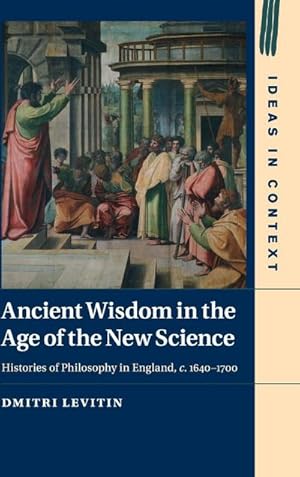9781107105881 - Ancient Wisdom in the Age of the New Science: Histories of Philosophy in England, c. 1640?1700: 113 (Ideas in Context, Series Number 113) von Levitin, Dmitri (4 Ergebnisse)
Suchfilter
Produktart
- Alle Product Types
- Bücher (4)
- Magazine & Zeitschriften (Keine weiteren Ergebnisse entsprechen dieser Verfeinerung)
- Comics (Keine weiteren Ergebnisse entsprechen dieser Verfeinerung)
- Noten (Keine weiteren Ergebnisse entsprechen dieser Verfeinerung)
- Kunst, Grafik & Poster (Keine weiteren Ergebnisse entsprechen dieser Verfeinerung)
- Fotografien (Keine weiteren Ergebnisse entsprechen dieser Verfeinerung)
- Karten (Keine weiteren Ergebnisse entsprechen dieser Verfeinerung)
- Manuskripte & Papierantiquitäten (Keine weiteren Ergebnisse entsprechen dieser Verfeinerung)
Zustand Mehr dazu
- Neu (2)
- Wie Neu, Sehr Gut oder Gut Bis Sehr Gut (1)
- Gut oder Befriedigend (Keine weiteren Ergebnisse entsprechen dieser Verfeinerung)
- Ausreichend oder Schlecht (Keine weiteren Ergebnisse entsprechen dieser Verfeinerung)
- Wie beschrieben (1)
Einband
- alle Einbände
- Hardcover (4)
- Softcover (Keine weiteren Ergebnisse entsprechen dieser Verfeinerung)
Weitere Eigenschaften
- Erstausgabe (1)
- Signiert (Keine weiteren Ergebnisse entsprechen dieser Verfeinerung)
- Schutzumschlag (Keine weiteren Ergebnisse entsprechen dieser Verfeinerung)
- Angebotsfoto (2)
Sprache (1)
Preis
- Beliebiger Preis
- Weniger als EUR 20 (Keine weiteren Ergebnisse entsprechen dieser Verfeinerung)
- EUR 20 bis EUR 45 (Keine weiteren Ergebnisse entsprechen dieser Verfeinerung)
- Mehr als EUR 45
Gratisversand
- Kostenloser Versand nach USA (Keine weiteren Ergebnisse entsprechen dieser Verfeinerung)
Land des Verkäufers
Verkäuferbewertung
-
ANCIENT WISDOM IN THE AGE OF THE NEW SCIENCE: HISTORIES OF PHILOSOPHY IN ENGLAND, C. 1640-1700.
Verlag: Cambridge University Press, Cambridge, 2015
ISBN 10: 1107105889 ISBN 13: 9781107105881
Sprache: Englisch
Anbieter: Any Amount of Books, London, Vereinigtes Königreich
Erstausgabe
EUR 46,73
EUR 20,98 für den Versand von Vereinigtes Königreich nach USAAnzahl: 1 verfügbar
In den Warenkorb8vo. Pp: xii, 670. First Edition. Blue and peach boards with colour illustrated front cover and white lettering. ISBN: 9781107105881 Near fine, with very slightly bumped head of spine.
-
Ancient Wisdom in the Age of the New Science: Histories of Philosophy in England, c. 1640?1700 (Ideas in Context, Series Number 113)
Verlag: Cambridge University Press, 2015
ISBN 10: 1107105889 ISBN 13: 9781107105881
Sprache: Englisch
Anbieter: Black Gull Books (P.B.F.A.), St Leonard's on Sea, Vereinigtes Königreich
Verbandsmitglied: PBFA
EUR 58,41
EUR 14,74 für den Versand von Vereinigtes Königreich nach USAAnzahl: 1 verfügbar
In den Warenkorbhardcover. Zustand: As New.
-
Ancient Wisdom in the Age of the New Science: Histories of Philosophy in England, C. 1640-1700
Anbieter: Revaluation Books, Exeter, Vereinigtes Königreich
EUR 166,52
EUR 17,01 für den Versand von Vereinigtes Königreich nach USAAnzahl: 2 verfügbar
In den WarenkorbHardcover. Zustand: Brand New. 1st edition. 686 pages. 8.00x5.00x1.00 inches. In Stock.
-
Ancient Wisdom in the Age of the New Science
Verlag: Cambridge University Press, 2015
ISBN 10: 1107105889 ISBN 13: 9781107105881
Sprache: Englisch
Anbieter: AHA-BUCH GmbH, Einbeck, Deutschland
Buch. Zustand: Neu. Druck auf Anfrage Neuware - Printed after ordering - Seventeenth-century England has long been heralded as the birthplace of a so-called 'new' philosophy. Yet what contemporaries might have understood by 'old' philosophy has been little appreciated. In this book Dmitri Levitin examines English attitudes to ancient philosophy in unprecedented depth, demonstrating the centrality of engagement with the history of philosophy to almost all educated persons, whether scholars, clerics, or philosophers themselves, and aligning English intellectual culture closely to that of continental Europe. Drawing on a vast array of sources, Levitin challenges the assumption that interest in ancient ideas was limited to out-of-date 'ancients' or was in some sense 'pre-enlightened'; indeed, much of the intellectual justification for the new philosophy came from re-writing its history. At the same time, the deep investment of English scholars in pioneering forms of late humanist erudition led them to develop some of the most innovative narratives of ancient philosophy in early modern Europe.




